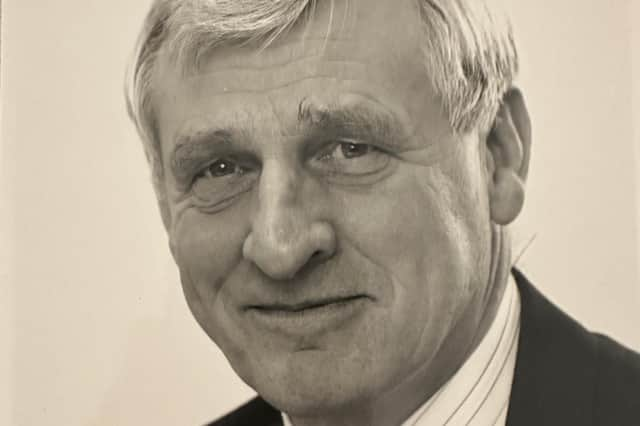Scotsman Obituaries: Scott Johnston OBE, National Farmers Union of Scotland chief executive


Until recently farmers in this country have been able to shelter under the Common Agricultural Policy of the European Union, one of whose main policies has been financial support for those producing livestock in the remote and disadvantaged areas of this country.
Without this targeted support, livestock production in these areas would have withered away, much to the specific detriment of Scottish agriculture but also to the wider national economy.
Advertisement
Hide AdAdvertisement
Hide AdWhen, during the early 1970s, the battle was being fought over what should and what should not be included in the then new European Union Common Agricultural Policy, Scott Johnston headed up the 20,000 member-strong National Farmers Union of Scotland.
As chief executive of the Union, his vision was clear. Among other priorities, any future farm policy had to include support for livestock producers living and working in Scotland’s less-favoured areas.
In order to convert European politicians more used to milk quotas and wine regimes to that point of view, he arranged visits to this country to persuade them of the importance of hill sheep and cattle production.
Thus, the Brussels-based politicians and bureaucrats were flown into Edinburgh and then shuttled off, often by helicopter, to see for themselves the challenges faced by those farming in this country.
The “come and see for yourself” policy was bold, but it paid off and it is marked down as one of the big successes in the Union’s one hundred years plus history as, in those days, Germany and France tussled over the main policies and it was unknown for a small nation such as Scotland to promote such a radical policy.
While the inclusion of support for hill livestock farmers was a notable victory, in his 18 years leading the NFUS Scott Johnston – who had been christened David Scott but who throughout his business life had used his second forename – fought many other battles for Scottish agriculture as it converted from the support system that had served the industry right up into the post-Second World War era.
Scott’s service to the Scottish agricultural industry was recognised in 1980 when he was awarded an OBE for his high-profile work on behalf of the sector.
He was never a militant defender of Scottish agriculture but when the occasion demanded he would stand shoulder to shoulder with the farmer members of the Union, whether this was at the head of a march protesting against foreign imports of food brought into this country produced to lower health standards or handing over petitions to politicians on policies adversely affecting Scottish farmers.
Advertisement
Hide AdAdvertisement
Hide AdFollowing his early education in Dundee, Scott went off to gain a degree in politics, philosophy and economics at Durham University.
He came back from that seat of learning with more than letters after his name as it was there he met his future wife, Sheila, who was studying on the same course.
After Scott had served two years of National Service, he and Sheila married in 1957 and set up home in Edinburgh.
This was just after Scott was appointed one of the policy advisers for the NFUS.
Their marriage produced three sons, David, Graeme and Douglas and, in due course, six grandchildren.
In work, Scott’s ability was recognised when he was appointed chief executive of the NFUS and this placed him on the front line in resolving disputes.
Some of those were settled face to face and his European counterparts were on more than one occasion discomfited by Scott’s knowledge of other languages.
From a lifelong interest in language nurtured in quieter periods during his National Service, he was fluent in French, German, Spanish and Italian and could, as he once said himself, “get by in Gaelic.”
Advertisement
Hide AdAdvertisement
Hide AdAlthough born and brought up in city life, Scott loved the Scottish countryside and spent many happy hours walking in the hills.
He climbed Munros but was not an obsessive “Munro bagger”, often preferring routes that provided more technical challenges.
This was not surprising as in his younger days Scott was a rock climber, tackling some of the most famous rock faces.
His other recreational interest was in cultivating a rock garden in his home in Edinburgh. Such was the scale and diversity of his alpine plants that other enthusiasts visited the garden he had created.
Paying tribute to Scott’s work, John Ross, Union president from 1990-1996, said his professional approach and drive had not only helped maintain but also enhanced Scotland’s role in Europe.
“He was always positive in his work and he always felt at ease dealing with farmers and crofters throughout Scotland,” he said.
Another former Union president, John Cameron CBE, who served the Union from 1979-1984, described Scott, apart from being extremely efficient at his work, as a great colleague and a good friend.
“He was equally well respected in a croft in Shetland, or in St Andrews House, or in the Agricultural Commission in Brussels,” said John.
Advertisement
Hide AdAdvertisement
Hide Ad“Wherever he went his mission was always for the benefit of Scottish farming and farmers.”
He added: “The industry will miss a good friend.”
Obituaries
If you would like to submit an obituary (800-1000 words preferred, with jpeg image), or have a suggestion for a subject, contact [email protected]